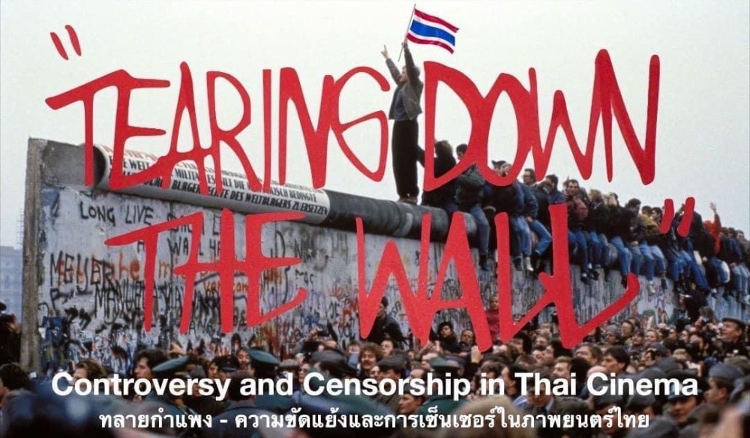
Why does Thai soft power languish behind South Korea’s? That question has been asked repeatedly over the past few years, following the international successes of the Oscar-winning film Parasite (기생충) and the blockbuster Netflix series Squid Game (오징어 게임), the latest examples of a Korean wave (hallyu) that began in the 1990s. Tearing Down the Wall: Controversy and Censorship in Thai Cinema (ทลายกำแพง — ความขัดแย้งและการเซ็นเซอร์ในภาพยนตร์ไทย), a panel discussion held last week, proposed an intriguing strategy to boost Thailand’s soft power: make more controversial movies.
Director Martin Barshai, who introduced the event, argued that Thailand should emulate Korean cinema, which “shocks and entertains and says something political or socially outrageous.” The central motion of the debate, proposed by moderator Stefan Rustler, was: “in order for the film industry to mature and advance, more controversy needs to be realised.” (Director Nontawat Numbenchapol made a similar point in an interview for Thai Cinema Uncensored: “I’d love to do a controversial issue. But it would be hard to stay in Thailand if I do something controversial in the future, super-controversial.”)
One of the panellists at Tearing Down the Wall, director Anucha Boonyawatana, argued that legislative changes were needed to give directors the opportunity to make more provocative films. She advocated replacing state censorship with self-regulation — “change the [Film and Video] Act from control to support the Thai entertainment industry” — which the Free Thai Cinema Movement had called for in 2007. (Free Thai Cinema campaigned successfully for the introduction of the Film and Video Act, though this was a Pyrrhic victory, as the Act was drafted by the conservative Ministry of Culture, described by panellist Pasakorn Vanasirikul as “the bottom-barrel ministry”.)
Another panellist, Naruemon Chaingam, who has made several courageous investigative documentaries, highlighted the problem of criminal defamation that “prevents filmmakers, journalists, even artists from be[ing] authentic or telling the truth” and results in widespread self-censorship. In fact, the prevalence of self-censorship was demonstrated by Pasakorn, who couldn’t bring himself to say the words ‘article 112’ — “I’m not gonna tell you what numbers that is” — that refer to the lèse-majesté (royal defamation) law.
Tearing Down the Wall took place on 2nd February on the rooftop of the Smalls bar in Bangkok. Controversial films may well draw an audience’s attention, as the debate motion suggested, though they also attract unwanted attention from the censors. In Thailand, that’s a rather high-risk strategy, though the panel ultimately concluded that it’s a risk worth taking.
Director Martin Barshai, who introduced the event, argued that Thailand should emulate Korean cinema, which “shocks and entertains and says something political or socially outrageous.” The central motion of the debate, proposed by moderator Stefan Rustler, was: “in order for the film industry to mature and advance, more controversy needs to be realised.” (Director Nontawat Numbenchapol made a similar point in an interview for Thai Cinema Uncensored: “I’d love to do a controversial issue. But it would be hard to stay in Thailand if I do something controversial in the future, super-controversial.”)
One of the panellists at Tearing Down the Wall, director Anucha Boonyawatana, argued that legislative changes were needed to give directors the opportunity to make more provocative films. She advocated replacing state censorship with self-regulation — “change the [Film and Video] Act from control to support the Thai entertainment industry” — which the Free Thai Cinema Movement had called for in 2007. (Free Thai Cinema campaigned successfully for the introduction of the Film and Video Act, though this was a Pyrrhic victory, as the Act was drafted by the conservative Ministry of Culture, described by panellist Pasakorn Vanasirikul as “the bottom-barrel ministry”.)
Another panellist, Naruemon Chaingam, who has made several courageous investigative documentaries, highlighted the problem of criminal defamation that “prevents filmmakers, journalists, even artists from be[ing] authentic or telling the truth” and results in widespread self-censorship. In fact, the prevalence of self-censorship was demonstrated by Pasakorn, who couldn’t bring himself to say the words ‘article 112’ — “I’m not gonna tell you what numbers that is” — that refer to the lèse-majesté (royal defamation) law.
Tearing Down the Wall took place on 2nd February on the rooftop of the Smalls bar in Bangkok. Controversial films may well draw an audience’s attention, as the debate motion suggested, though they also attract unwanted attention from the censors. In Thailand, that’s a rather high-risk strategy, though the panel ultimately concluded that it’s a risk worth taking.
